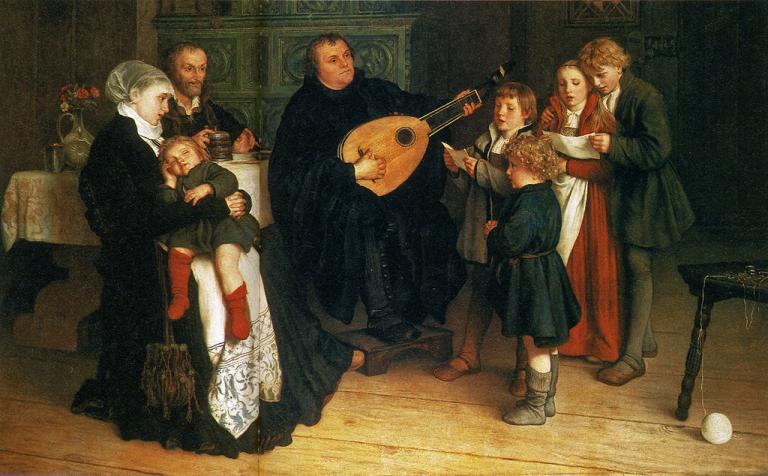Today, it has been said that the only places people still sing together is in church and during a ball game. But now, with our 2020 troubles, singing in those two remaining places has become problematic. Church singing risks spreading coronavirus in the air and singing the National Anthem has become an occasion for protests and controversy.
Music today has been reduced to a performance. We listen to someone else sing. We can go to concerts, download music, or stream it via the internet. If we sing ourselves, we emulate the performers, whether in the shower or in a karaoke bar. Even music education, it seems to me, has become oriented to training professional performers, as opposed to making music for personal or corporate expression.
We watch and listen to the musical performer from a distance. People used to form a circle when they sang or played music, so that they can hear each other (as in the song “Will the Circle Be Unbroken?”).
This loss, or marginalization or narrowing, of music is a great loss to our culture, to our cohesiveness as human beings and to the integration of beauty into our everyday lives. Esolen sees it also as a loss of character-building.
He explores the moral significance of music, how it has historically been seen as a way of educating and channeling the passions and as a means of inspiring virtue. Esolen draws on Plato, as well as C. S. Lewis:
Plato understood the power of music, and that is why he said that all education was at base a musical one. For music is expressive of a harmony between body and soul. It appeals most directly to the seat of rational or irrational passions, depending on what kind of music we are talking about. There is all the difference in the world between a man who knows what to do and has the heart to do it, and the man who knows what to do but will not do it, because he lacks the courage, the chest, as C. S. Lewis would call it in The Abolition of Man, following Plato’s lead in the Phaedrus and the Republic. ‘The good man,” says Plato, “is the only excellent musician, because he gives forth a perfect harmony not with a lyre or other instrument but with the whole of his life.” Good music builds the chest.
Bad music lets the chest cave in. Plato said that the first sign of decay in a commonwealth would be a radical change in the people’s music. An elderly minister once told me, and my experience confirms it, that when a congregation is about to go bad, the first thing to be corrupted will be the music. (p. 132).
Esolen concludes, “The head rules the belly through the chest, said Lewis. Otherwise the belly, or the region further south, will rule, and the head will be mainly employed in finding excuses for the groin” (p. 133).
Music is important in developing good character, according to Esolen, because “when we sing, we give artistic form to our thoughts and words and passions” (p. 140).
This is not just a matter of aesthetic form, though it includes that. Music can help us form “our thoughts and words and passions” in a way that is beautiful, yes, but also good and true. Thus, music–in particular, the songs we sing–helps give a salutary form to our appetites and passions: not just sexual desire but romantic love; not just fighting but heroism; not just doctrine but worship.
Then again, music can also misdirect our thoughts and words and passions, indulging the appetites instead of forming them.
Esolen applies all of this to the formation of boys, and in doing so brings in a wealth of specific examples of how songs–including poetry, with a special emphasis on hymns–have functioned historically in the development of character and in the cultivation of virtues such as courage, love, and commitment.
I cannot do justice here to the depth and scope of his discussion. You need to read the book.
Esolen grounds his analysis in the example of Jesus Himself:
“When Jesus had broken the bread at the Last Supper and shared the wine–instituting the sacrament of the Eucharist–and commanded his apostles to go and do the same in remembrance of him, he and they proceeded to do something else in remembrance. They sang a hymn (see Mt 26:30)” (p. 127).
And Esolen’s analysis of the ways music can influence and motivate us helped me to understand the negative example described by Shakespeare in Merchant of Venice:
The man that hath no music in himself,
Nor is not moved with concord of sweet sounds,
Is fit for treasons, stratagems and spoils;
The motions of his spirit are dull as night
And his affections dark as Erebus:
Let no such man be trusted. Mark the music. (Act V. scene 1. lines 81-86)
Illustration: “Luther in the Circle of His Family Making Music” by Gustav Spangenberg, Museum der bildenden Künste / Public domain via Wikimedia Commons











